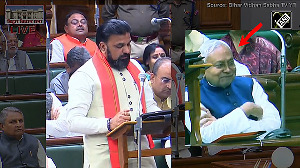The inflation worries are not yet over though the rate of price rise has come down from a peak of 12.82 per cent in August to 8.40 per cent for the week ended November 22, says India's chief statistician Pronab Sen.
"We can't really say that we are completely out of the woods yet," he told PTI pointing out that inflation in the manufacturing and food prices will continue to be there. "Anybody who is saying that inflation would go below three per cent or negative. . . I think is wishful thinking," Sen said. Reserve Bank, too, had recently said that record rise in retail prices (Consumer Price Inflation) in September and October "...is possibly owing to firm trend in food article inflation". Some research agencies such as Edelweiss Capital had earlier pointed out that inflation will be near zero in the second half of 2009 on account of economic slowdown and falling commodity prices. ". . .with falling commodity prices and economic slowdown inflation will be near zero in certain periods of 2009," Edelweiss Chairman Rashesh Shah had said. The wholesale price-based inflation soared after the government increased the petroleum prices in June and peaked to 12.82 per cent for the week ended August 9. The rate of price rise, however, started declining with fall in commodity and crude prices in the international market. Falling crude prices, which dipped to about $42 per barrel from a high of $147 a barrel, prompted the government to reduce per liter price of petrol and diesel by Rs 5 and Rs 2 respectively, in the first week of December which is expected to have a benign impact on prices.Noting that inflation has come down mainly on account of moderation in prices of commodities such as oil, iron and steel, Sen said, "Secondary inflationary effects, which is the effect that passes through the manufacturing sector, continues."
It is only when the secondary effects moderate, the inflation would come down, he said, adding "Even at 8.5 per cent inflation is too high". Talking about the variation in inflation for wholesale and retail prices, Sen said, "WPI captures the entire range of production, the full value chain, right from the raw material to the finished product. CPI, on the other hand measures inflation only at the last point, which is the product that is directly sold to the consumer". He further said, "If there is an inflationary impulse at an upstream stage of production, it will show up first in the WPI. "So, what you got is a situation where the WPI peaked at 12.9 per cent a month ago and then it started coming down. "The CPI hasn't peaked yet. It is still going up. Basically, there is a lag".In view of the time lag, Sen said, "CPI should start falling somewhere between two and three months".
The RBI also pointed out that, "Consumer price inflation, too, can be expected to soften in the months ahead".
Referring to the oil prices, Sen said, the expectation that crude oil prices in the international market can go down to $20 a barrel is 'wrong' and based on the assumption that oil prices will not go up again.
"Oil prices at $43 to the barrel is just too low. That has happened simply because there were extra stocks floating around in the system.
People had to offload them, the speculative element vanished, so all of that happened. But, soon or later that's going to stabilise," he said.






 © 2025
© 2025